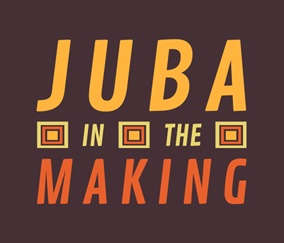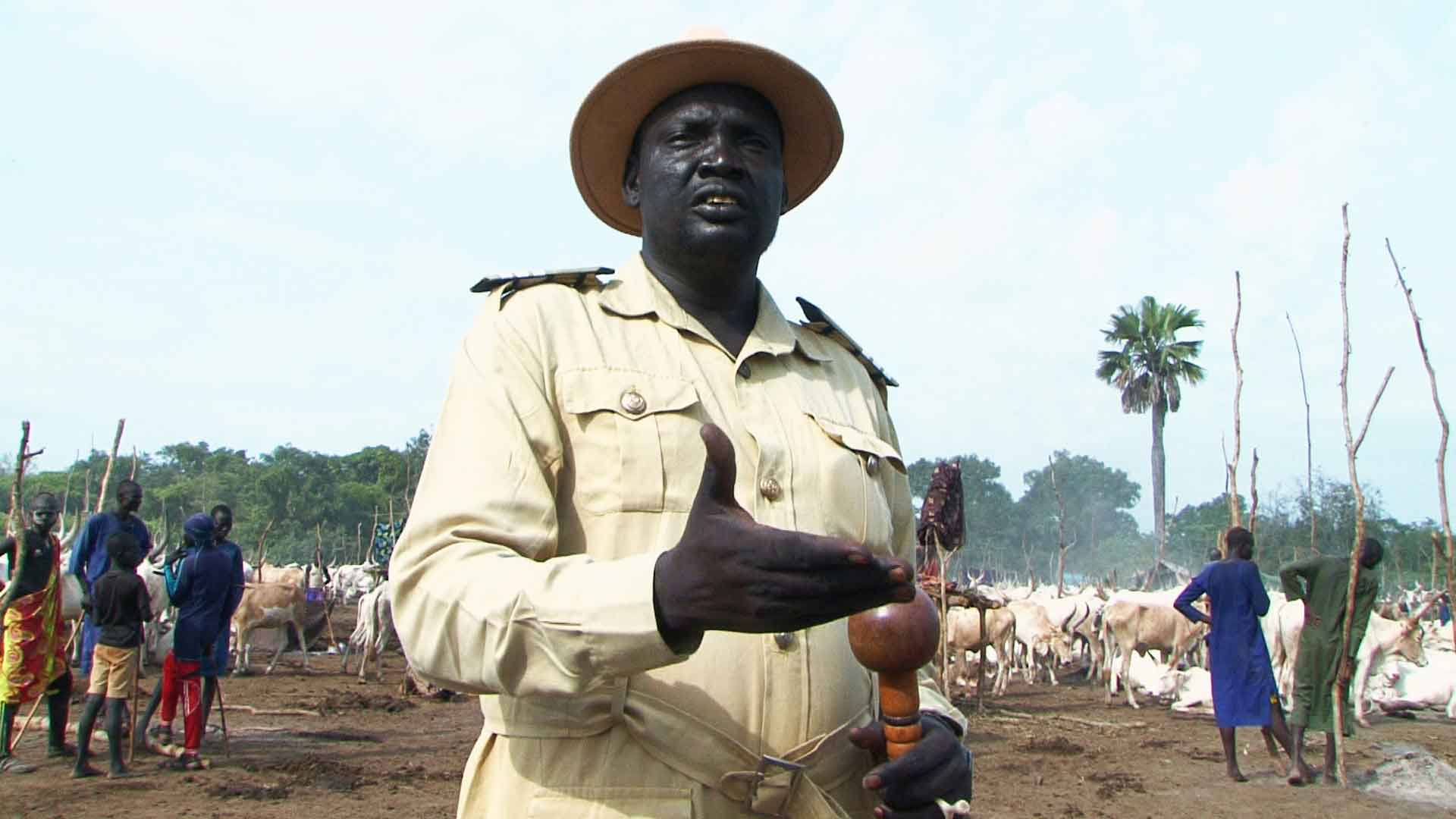And The Country Still Needs Us
The perspective of filmmaker Florence Miettaux:
What is the work of a chief in South Sudan? What kind of problems are customary leaders dealing with on a daily basis? Are chiefs still important in the country? What do younger generations think about them? These are some of the questions that guided the making of our new film: And The Country Still Needs Us – A Story of the Chiefs of South Sudan.
The film was shot throughout 2018 in Juba, Aweil and Yirol, and was produced as a partnership between Juba In The Making and the Rift Valley Institute (RVI), an organization which has for years carried out research on the changing roles of customary authorities in South Sudan, with funding from the Swiss government (see Mimi Kuer Bior’s contribution below).
In 2018, RVI was to organize three chiefs meetings, in Aweil, Juba and Yirol. The plan was that our small film crew – composed of Rami Arshesh and I, Florence – would travel alongside and conduct filming with the chiefs involved in these meetings. As a film crew, we would be assisted in turns by RVI researchers Diing Majok, Machot Amuom, Gabriel Kiir and journalist Silvano Yokwe. They would guide us in these places they know very well, and they would help us translate and understand the context.
The main idea was to follow some of the chiefs in their daily work: in their courts, in their cattle-camps or farms, and to talk to women and youths who are part of their communities and villages, but who still rarely get to become chiefs. Through this diversity of voices, we wanted to take a look at what is going on in South Sudan today, and how traditional leaders are trying to “fill the gaps”, to curb violence or to lobby for the provision of services to their communities who still suffer from years of civil war and economic hardship.
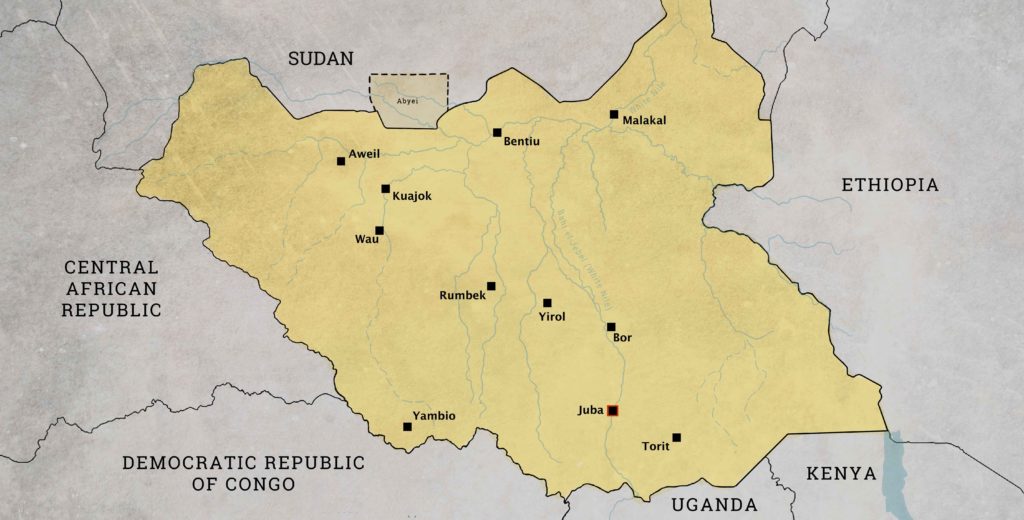
Understanding the background, imagining the film
Since 2017, RVI had started producing a series of reports looking at how customary authorities were evolving in South Sudan, and how chiefs were involved in war, peace and other aspects of socio-economic life, in several parts of the country. As a filmmaker, having access to this well documented, recent research was a great asset, to understand the historical background of the regions where we were going to film, to get to know who were the most prominent chiefs and the main issues they were dealing with in their respective localities.
Reading these reports helped inform my perception of chiefs, and perhaps counter-balance my tendency to look at chiefs with sympathy, as positive figures dedicated to the welfare of their communities. Well, it was obviously more complicated. In fact, what Dr Nicki Kindersley described as the “ambivalence” of customary leaders resonated like a warning of sorts. “By exploring the ambivalence of these particular histories,” she writes, “it is apparent that customary authorities are not automatically a neutral or benign social force. Chiefs act as local brokers and mobilizers, which is often a difficult or dangerous position but nonetheless one that affords significant opportunity for personal benefit” (read the full report here)
This echoes what, in another RVI report, Dr. Cherry Leonardi would write later on, in 2019: “In a context of ongoing political uncertainty, economic hardship and humanitarian need, it is important to recognise the value of less tangible resources held and generated by South Sudanese, as they draw on deep historical, spiritual and cultural sources of inspiration and identity to try to forge a sense of order even in the midst of conflict and displacement. Yet custom should not be romanticised: it can be used to define communities in exclusionary ways, to preserve patriarchal structures and to exert control over people” (read the report here)
But most of all, this research and analysis was a “key” to understand for instance the peace-making role of chiefs in the Greater Yirol region, greatly captured and analysed in John Ryle and Machot Amuom’s Peace is the Name of our Cattle-camp. Local responses to conflict in Eastern Lakes State, South Sudan. It allowed to grasp with complex realities, such as how seasons influence conflicts, or the meaning of the “Cooking Pot Monument” in the centre of Yirol town. This report, specifically, allowed to reflect on why this region was more peaceful than others, and at the centre of this question, was the role played by customary leaders and their relationship with young people.
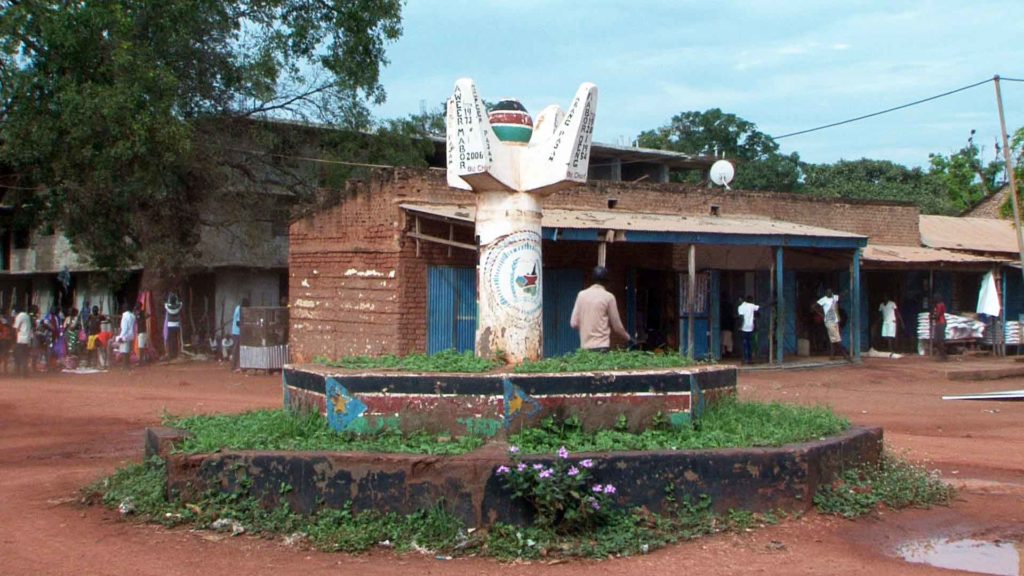
Stories we found and stories that found us
With this analysis in mind, it was both easier and more challenging to imagine what a film could capture; a film, with its limited and simplified content, but at the same time with its own power of evocation. I could start to develop my own gaze on this reality, more informed thanks to the anthropological and historical works available, but trying not to be obstructed or intimidated by them. I and Rami worked with RVI researchers to go and film what we thought were the most important stories and witnesses. It was a bit chaotic and extremely tiresome, but we did manage to interview fascinating people and film visually powerful scenes.
In Aweil, with the assistance of researcher Diing Majok, we wanted to record the story of Abakar Salathin Decak, the chief who “guided” the South Sudanese returnees back from Khartoum to Aweil, at the time when South Sudan reached independence, in 2011. I wanted also to be able to capture the involvement of chiefs into the liberation war led by the SPLA from 1983 to 2005, and we managed to film a long interview with chief Akot Akot Dut, who had been made a chief by John Garang, after joining the SPLA, in the late 1980s. We also had a chance to film women who had returned from Khartoum following the independence of South Sudan, and who have since faced huge challenges and survived the way they could, as most of their husbands returned to the north to look for jobs. They feed their kids through the sale of small food items in the market. Although it happened almost by chance, we documented their voices, and they resonate in a powerful way.
In Aweil we also filmed an extraordinary man, the father of Gabriel Kiir (who was facilitating and translating the meeting organised by RVI): William Amuoi Mabior, educationalist, who proudly reminds his visitors that he had taught a pupil named Salva Kiir, back in the 1950s. This man is probably the oldest man in the country, his age is unknown but he surely passes 100 years. He told us about how chiefs used to handle cases in the past, a long long time ago… We also had the chance to interview chief Acien Acien Yor, who told us with a touch of pessimism: “we the chiefs cannot determine the future”.
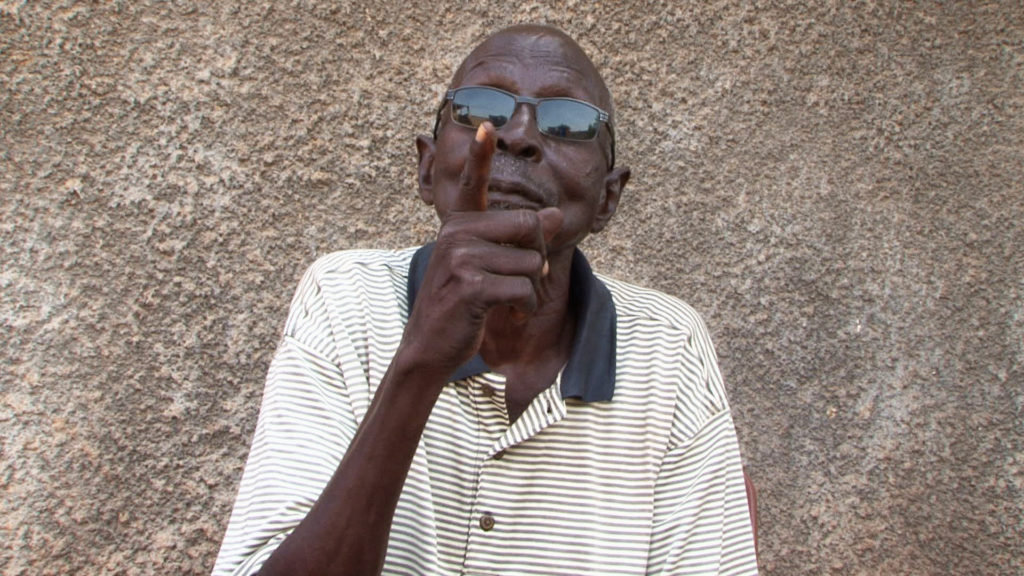
But the positive role played by chiefs kept appearing on camera, not necessarily anticipated. In Aweil, we interviewed Angelina Akol Nyuol, a student who had been saved by her chief Manyuot Mawien Deng from a forced marriage in Wau. And in Yirol we followed the work done by chief Andrew Madut Buoi with the youths in his cattle camp, who had been disarmed, and that of chief Kon Mayor Machar, whose farm in Aluakluak was attacked by raiders from neighbouring Rumbek. We were lucky to document the peace building role of the ancient practice of wrestling as a special game was organized during RVI’s report release in October 2018. We also interviewed several young activists, in Juba, and asked them about their relationship with chiefs. Here again, something happened that we did not necessarily expect. But I’ll leave it here and not spoil the surprise. Watch the film and see for yourself!
After a year and half of writing, filming, translating, editing, the film was finalized in late 2019, and selected in several African festivals. It was shown at the Swiss House in Juba and within the United Nations Mission In South Sudan (UNMISS), and we understand it will be used in new activities in the country by the UN, as a peace-building medium. With this online release we hope the film lives an expanded life, and most importantly contributes to increasing the knowledge and understanding of South Sudan around the world.
Florence Miettaux
The perspective of Mimi Kuer Bior, RVI South Sudan Programme Officer:
Over the past five years of the project, RVI has built a strong level of trust with customary authorities across the country. Continued engagement with chiefs is essential, particularly in finding ways to support and present the views and interests of their communities at the national level, and to positively influence the political and social realities of South Sudan.
Throughout phase IV (2018/2019), we held a variety of meetings across the country – using the reports and research conducted in previous project phases as a basis for discussion – with chiefs, youth, women and the wider community. The format for these meetings differed depending on the location and the expressed interests of the participants involved.
It was within these meetings that most of the film footage was captured. The film documents the discussions during phase IV that highlight key issues raised by the chiefs themselves to stimulate conversation across South Sudan, and to better inform donors and policymakers around some of the key debates. The film maker, Florence Miettaux, utilised the meetings to present a sympathetic and nuanced picture of the realities of chiefs and their communities in South Sudan. The reactions we have received so far from audiences demonstrates how few opportunities there are to see these realities documented.
It is our hope that by documenting of individual stories and histories from chiefs and youth across South Sudan, we would contribute to a broader picture of the realities of customary authorities in South Sudan – amongst national and international actors.
Mimi Kuer Bior
Landing
Senza categoria


